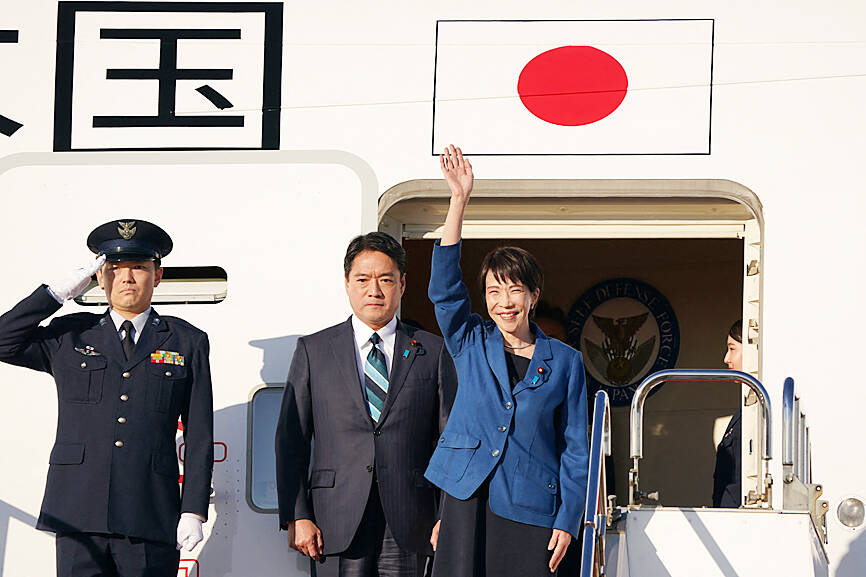Japanese Prime Minister Sanae Takaichi rebuffed demands from China to retract her recent comments about Taiwan, saying there was no change to Tokyo’s stance on how it would respond to a major regional security crisis.
Takaichi became the first sitting Japanese leader in decades to publicly link a Taiwan Strait crisis with the possible deployment of Japanese troops, prompting a furious response and economic retaliation from Beijing.
Since then, she has limited herself to the more vague positions and reiterated that stance yesterday to reporters before departing for a G20 meeting in South Africa.

Photo: AFP
“Regarding a situation threatening Japan’s existence, the government will make a comprehensive judgement based on all available information, taking into account the specific circumstances of each actual situation as it arises,” Takaichi said. “I myself have repeatedly stated this position in my responses. The government’s stance remains consistent.”
While Chinese officials, state media and diplomats have mounted an intense effort to pressure her to retract her comments, Takaichi and her senior officials have sought to dial down tensions and move beyond the issue.
So far that approach has come up short.
Japan should “correct the wrongful remarks and wrongdoings at once, and take practical steps to honor its commitments to China,” Chinese Ministry of Foreign Affairs spokeswoman Mao Ning (毛寧) said yesterday.
Takaichi said she wanted to continue to try and improve relations after she met with Chinese President Xi Jinping (習近平) at the APEC summit in South Korea last month.
“President Xi and I confirmed the broad direction of comprehensively advancing our strategic and mutually beneficial relationship, and building a constructive and stable relationship. There has been no change whatsoever in this stance,” Takaichi said.
China is set to be represented at the G20 by Premier Li Qiang (李強), but there are no plans for him to meet with Takaichi.
A meeting between Japanese and Chinese diplomats earlier this week appeared to have done little to soothe tensions.

DAREDEVIL: Honnold said it had always been a dream of his to climb Taipei 101, while a Netflix producer said the skyscraper was ‘a real icon of this country’ US climber Alex Honnold yesterday took on Taiwan’s tallest building, becoming the first person to scale Taipei 101 without a rope, harness or safety net. Hundreds of spectators gathered at the base of the 101-story skyscraper to watch Honnold, 40, embark on his daredevil feat, which was also broadcast live on Netflix. Dressed in a red T-shirt and yellow custom-made climbing shoes, Honnold swiftly moved up the southeast face of the glass and steel building. At one point, he stepped onto a platform midway up to wave down at fans and onlookers who were taking photos. People watching from inside

A Vietnamese migrant worker yesterday won NT$12 million (US$379,627) on a Lunar New Year scratch card in Kaohsiung as part of Taiwan Lottery Co’s (台灣彩券) “NT$12 Million Grand Fortune” (1200萬大吉利) game. The man was the first top-prize winner of the new game launched on Jan. 6 to mark the Lunar New Year. Three Vietnamese migrant workers visited a Taiwan Lottery shop on Xinyue Street in Kaohsiung’s Gangshan District (崗山), a store representative said. The player bought multiple tickets and, after winning nothing, held the final lottery ticket in one hand and rubbed the store’s statue of the Maitreya Buddha’s belly with the other,

‘NATO-PLUS’: ‘Our strategic partners in the Indo-Pacific are facing increasing aggression by the Chinese Communist Party,’ US Representative Rob Wittman said The US House of Representatives on Monday released its version of the Consolidated Appropriations Act, which includes US$1.15 billion to support security cooperation with Taiwan. The omnibus act, covering US$1.2 trillion of spending, allocates US$1 billion for the Taiwan Security Cooperation Initiative, as well as US$150 million for the replacement of defense articles and reimbursement of defense services provided to Taiwan. The fund allocations were based on the US National Defense Authorization Act for fiscal 2026 that was passed by the US Congress last month and authorized up to US$1 billion to the US Defense Security Cooperation Agency in support of the

HIGH-TECH DEAL: Chipmakers that expand in the US would be able to import up to 2.5 times their new capacity with no extra tariffs during an approved construction period Taiwan aims to build a “democratic” high-tech supply chain with the US and form a strategic artificial intelligence (AI) partnership under the new tariffs deal it sealed with Washington last week, Taipei’s top negotiator in the talks said yesterday. US President Donald Trump has pushed Taiwan, a major producer of semiconductors which runs a large trade surplus with the US, to invest more in the US, specifically in chips that power AI. Under the terms of the long-negotiated deal, chipmakers such as Taiwan Semiconductor Manufacturing Co (TSMC, 台積電) that expand US production would incur a lower tariff on semiconductors or related manufacturing